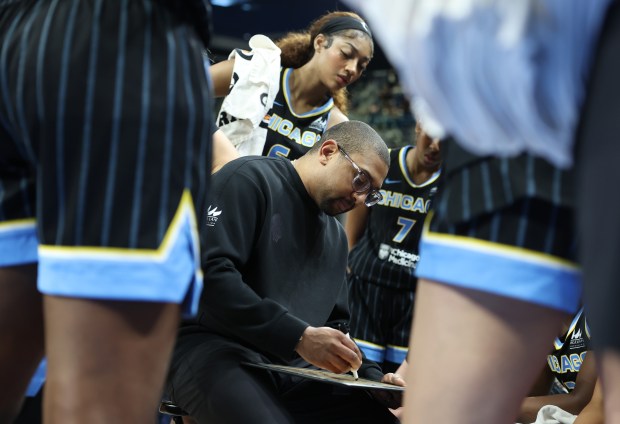The Department of Justice is reviewing the convictions in the landmark “ComEd Four” bribery case involving former House Speaker Michael Madigan on counts involving violations of the Foreign Corrupt Practices Act, which the Trump administration says has been stretched beyond its intended reach.
The revelation, which further threatens to unwind what had been a slam-dunk victory for the U.S. attorney’s office, came during a status hearing in the ComEd case on Thursday, where prosecutors asked to proceed to sentencing on the counts that U.S. District Judge Manish Shah left standing.
Defense attorneys strongly objected, saying they received a letter recently from U.S. Attorney General Pam Bondi’s office saying the case was under review by the Department of Justice, which would make a decision whether the false statements counts charged under the FCPA should be dropped.
The defense also said the Supreme Court’s ruling last week in the case of former Chicago Ald. Patrick Daley Thompson gives them further ammunition to argue that the false statements counts should not stand.
Assistant U.S. Attorney Sarah Streicker, however, said they have no timetable on when the attorney general might weigh in and have “received no guidance” on what the decision might be. “We will follow whatever guidance we get,” she said.
Streicker also said there was no basis to delay sentencing any further in this case, including over the issue of Thompson’s case, which she said involves a different statute and has no bearing on the ComEd verdict.
“The defendants have had more than a full opportunity over the past two years to make post trial motions…It is now time for sentencing,” Streicker said. There is no basis to just delay sentencing based upon a hope that something might turn the defendant’s way.”
Shah agreed, saying he was satisfied that a proceeding to sentencing would finally bring the prosecution to a close and leave it in the hands of appellate courts. He said he wanted to sentence the four defendants separately sometime in July and asked the parties to consult their schedules and get back to him.
Before the hearing adjourned, however, attorney Patrick Cotter, who represents longtime Madigan confidant Michael McClain, appeared to grow agitated, telling the judge that the defendants could find themselves sentenced on charges just before the Department of Justice rules should never have been brought in the first place.
“It seems to me, to be quite frank, reckless to proceed with sentencing,” Cotter said. “It does affect the position of the defendants …I would ask you to consider waiting until we get a response.”
But Shah denied the request without further argument. “I don’t agree it is reckless,” he said, adding that if something changes, he “sure you’ll tell me.”
“You have your lines of communication with the Department of Justice and I’m not doing anything to interfere with that,” Shah said. “My view is that it’s more important to proceed to conclusion than wait on uncertain and amorphous deliberations happening” in Washington.
The ComEd Four defendants — McClain, former ComEd CEO Anne Pramaggiore; internal ComEd lobbyist John Hooker; and consultant Jay Doherty — were convicted in May 2023 in an alleged scheme by the utility to funnel payments to Madigan-favored contractors in exchange for the longtime Democratic speaker’s influence over legislation in Springfield.
Earlier this month, Shah granted a new trial on some counts, saying the Supreme Court’s ruling last year on a key bribery statute means the jury was not instructed properly.
In making his ruling, however, Shah left intact the convictions on a number of other counts, including the lead count of conspiracy and charges alleging the defendants cooked ComEd’s books to hide the scheme.
Adding to the complexity was that four of the five counts that were left standing involve violations of the Foreign Corrupt Practices Act. Last month, President Donald Trump ordered a review of how the Justice Department enforces that law, which he said has been “stretched beyond proper bounds and abused in a manner that harms the interests of the United States.”
In the ComEd Four case, the four defendants were convicted for falsifying books and records, not any bribery of foreign officials that the law originally sought to punish, the defense pointed out in asking Shah last month to stay the proceedings.
Madigan, meanwhile, once the most powerful politician in the state, was found guilty on Feb. 12 of bribery conspiracy and other corruption charges alleging he used his public office to increase his power, line his own pockets and enrich a small circle of his most loyal associates.
But neither prosecutors nor Madigan could declare total victory in that case either. Jurors’ final verdict was overall mixed, deadlocking on several counts — including the marquee racketeering conspiracy charge — and acquitting Madigan on numerous others.
Jurors also deadlocked on all six counts related to McClain, who was charged in both the Madigan and ComEd Four indictments.
jmeisner@chicagotribune.com



